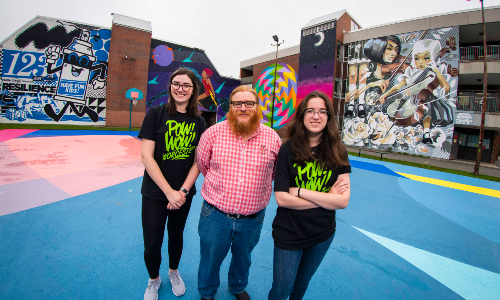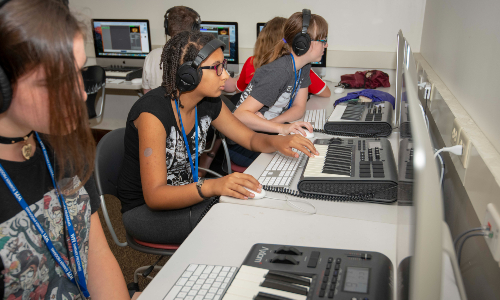Faculty Impact
From research that impacts city businesses and organizations, to working with Worcester teachers and schoolchildren to preserving the environment, WPI faculty contribute their time and expertise to the Worcester community year-round. Here are some examples.
WPI’s STEM Education Center: 10 years of partnership and commitment
The STEM Education Center at WPI is committed to supporting PreK-12 students, educators, and families in the Worcester community and greater Central Massachusetts region with equitable access to high-quality, integrated, and inclusive STEM education opportunities through a STEM ecosystem. To accomplish this, the STEM Education Center has worked with an AmeriCorps volunteer to promote STEM volunteer opportunities with WPI and the Worcester Community.


Documenting Worcester’s History and Beauty
Joseph Cullon, professor of teaching in WPI’s Humanities and Arts Department, is part of the team behind Digital Worcester, a digital public history clearinghouse established by the Worcester Historical Museum and WPI’s Humanities and Arts Department. It works with cooperating institutions to digitize, preserve, and publish historical materials online and to collaboratively code big historical data through crowdsourcing activities. WPI students have contributed to Digital Worcester as part of their Interactive Qualifying Projects (IQP), the junior year project that focuses on the intersection of technology and society.
Cullon and his students also created an extensive, heavily researched catalog of the POW! WOW! murals painted at 22 locations around the city in 2016 and 2017. The interactive mural tour of POW! WOW! Worcester employs brilliant photos, archival images of the buildings on which the artwork is painted, text describing the historical and cultural significance of mural locations, links to artists’ web pages, and interactive digital maps that locate and provide directions to the sites.
Preserving and Promoting Little Indian Lake
Aaron Sakulich, associate professor of engineering in WPI’s Department of Civil, Environmental, and Architectural Engineering, has advised many WPI students on projects on Little Indian Lake. These projects have focused on a range of issues from designing walkable pathways and Canada geese management, to recommendations for modernizing the lake association’s archival management and promoting fishing at Little Indian Lake and throughout the city’s waterways.
Girls Talk Math
An innovative summer mathematics and media camp for girls and nonbinary students that was co-founded by WPI researcher Francesca Bernardi launched in July 2022 at WPI with 19 campers who spent two weeks learning to solve advanced problems while podcasting and blogging about their work. Preference was given to Worcester Public School students.
The day camp aims to show high school girls and nonbinary students from under-represented communities that mathematics can play a role in any field that the campers find interesting. The camp is innovative in the way it seeks, challenges, and supports campers. Rather than asking applicants to submit written documents with their class grades and letters of reference, Girls Talk Math asks applicants to submit audio or video recordings stating their reasons for applying. Campers also create blogs and podcasts that will go into an online repository of media created by campers. The camp is free to attend and, for the first time, paid each camper a $250 stipend.

Music Technology Camp
The music technology camp at WPI, supported by the Les Paul Foundation, is a week-long immersive experience through which middle school and high school students learn to use technology to facilitate musicianship. The camp was founded in 2013 by WPI music professor V.J. Manzo who wrote the curriculum with the principal idea that any student, including students without any prior music training, could use technology and technology-based musical instruments to learn how to compose and perform original music. Since that time, the camp has run multiple sessions for students of different ages and experience levels. Campers in this program use music technology software, hardware, and instruments developed in Manzo’s research labs (Electric Guitar Innovation Lab & Interactive Music Systems Lab) as tools toward learning to compose and perform their own music. These tools offer increased accessibility for non-musicians and promote a sense of community by actively engaging students in small teams toward creative goals.
Refugee Resettlement
WPI Business School Professors Andy Trapp and Renata Konrad, and PhD students have joined an international team of researchers to develop a computational tool to help humanitarian aid organizations improve refugees’ chances of successfully integrating into a new community. Known as Annie™ MOORE (Matching and Outcome Optimization for Refugee Empowerment), named after the first recorded immigrant entering the U.S. through New York’s Ellis Island in the late 1800s, the tool integrates machine learning and optimization to generate data-driven, optimized recommendations on refugee placements. Annie™ was developed in close collaboration with U.S. resettlement agency HIAS (founded as the Hebrew Immigrant Aid Society) and has been deployed there since May 2018.
As hundreds of Afghan refugees resettled in Worcester, WPI Business School Director of Graduate Programs Sandy Wellinghoff, Professors Wally Towner and Jim Ryan, and WPI students working in the Business School’s Small Business Digitization Services Initiative, collaborated with Worcester officials to develop the Worcester Together Refugee Response website. This website coordinates support efforts and resources, making it possible for community members to get involved in helping alleviate a humanitarian crisis.